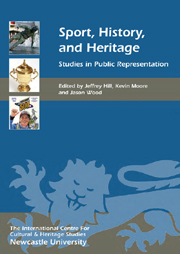Book contents
- Frontmatter
- Contents
- List of Illustrations
- Acknowledgments
- Sport, History and Heritage: An Investigation into the Public Representation of Sport – Editors' General Introduction
- HISTORY, HERITAGE AND SPORT
- MUSEUMS AND THE REPRESENTATION OF SPORT
- 7 Sport in Museums and Museums of Sport: An Overview
- 8 The Everton Collection: Unlocking the Value of a National Football Archive
- 9 Culture, Commerce, Capitalism and Commemoration: Dmitri Piterman and the Alavés Football Museum
- 10 Replacing the Divots: Guarding Britain's Golfing Heritage
- 11 Upping Our Game: The New Wimbledon Lawn Tennis Museum
- SURVIVALS AND LEGACIES: SPORT, HERITAGE AND IDENTITY
- Afterword: History and Heritage in Sport
- List of Contributors
- Index
- HERITAGE MATTERS
8 - The Everton Collection: Unlocking the Value of a National Football Archive
from MUSEUMS AND THE REPRESENTATION OF SPORT
Published online by Cambridge University Press: 05 April 2013
- Frontmatter
- Contents
- List of Illustrations
- Acknowledgments
- Sport, History and Heritage: An Investigation into the Public Representation of Sport – Editors' General Introduction
- HISTORY, HERITAGE AND SPORT
- MUSEUMS AND THE REPRESENTATION OF SPORT
- 7 Sport in Museums and Museums of Sport: An Overview
- 8 The Everton Collection: Unlocking the Value of a National Football Archive
- 9 Culture, Commerce, Capitalism and Commemoration: Dmitri Piterman and the Alavés Football Museum
- 10 Replacing the Divots: Guarding Britain's Golfing Heritage
- 11 Upping Our Game: The New Wimbledon Lawn Tennis Museum
- SURVIVALS AND LEGACIES: SPORT, HERITAGE AND IDENTITY
- Afterword: History and Heritage in Sport
- List of Contributors
- Index
- HERITAGE MATTERS
Summary
Britain, as the birthplace of many of the world's major sports, has a unique sporting heritage. However, the development of dedicated sports museums and archives in the UK has been comparatively late, in contrast with the situation in, for example, North America (Danilov 2005). Why, for example, was it that the National Soccer Hall of Fame and Museum opened in the USA in 1979 but that the National Football Museum for England, the birthplace of Association Football, opened in 2001? Moore has argued that this relates to the perceived lack of value and relevance placed on sport by the wider museums and archives sector in the UK, reflecting in turn issues of high and popular culture in museums, and ultimately issues of class (Moore 1997; 2008).
While the development of dedicated sports museums in the UK has been comparatively recent, there are now golf, tennis, cricket, horseracing, rugby, rowing and football museums. A number of Premiership football clubs have also opened museums and many other sports clubs have memorabilia displayed within their grounds. Yet our sporting heritage is not just preserved in museums or sporting venues. Sporting archives are held in record offices across the country. From sporting photographs and newspaper reports to match programmes, club publications and official papers, many of these sporting archives remain relatively unexplored. Furthermore, record offices themselves have yet to fully unlock the potential of their sporting archives.
- Type
- Chapter
- Information
- Sport, History, and HeritageStudies in Public Representation, pp. 107 - 124Publisher: Boydell & BrewerPrint publication year: 2012



